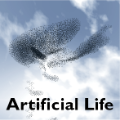Genetic algorithms, computer programs that simulate natural evolution, are increasingly applied across many disciplines. They have been used to solve various optimisation problems from neural network architecture search to strategic games, and to model phenomena of adaptation and learning. Expertise on the qualities and drawbacks of this technique is largely scattered across the literature or former, motivating an compilation of this knowledge at the light of the most recent developments of the field. In this review, we present genetic algorithms, their qualities, limitations and challenges, as well as some future development perspectives. Genetic algorithms are capable of exploring large and complex spaces of possible solutions, to quickly locate promising elements, and provide an adequate modelling tool to describe evolutionary systems, from games to economies. They however suffer from high computation costs, difficult parameter configuration, and crucial representation of the solutions. Recent developments such as GPU, parallel and quantum computing, conception of powerful parameter control methods, and novel approaches in representation strategies, may be keys to overcome those limitations. This compiling review aims at informing practitioners and newcomers in the field alike in their genetic algorithm research, and at outlining promising avenues for future research. It highlights the potential for interdisciplinary research associating genetic algorithms to pulse original discoveries in social sciences, open ended evolution, artificial life and AI.
翻译:基因算法,即模拟自然进化的计算机程序,越来越多地应用于多个学科,用来解决神经网络结构搜索到战略游戏以及模拟适应和学习现象等各种最佳化问题。关于这种技术的素质和缺点的专门知识,大部分分散于文献或以前,促使根据该领域的最新发展情况汇编这种知识。在这次审查中,我们介绍基因算法、其品质、限制和挑战以及一些未来的发展前景。遗传算法能够探索可能的解决办法的庞大和复杂空间,迅速找到有希望的要素,并提供适当的建模工具来描述从游戏到经济的进化系统。然而,这些技术的素质和缺点却受到高计算成本、困难的参数配置以及解决办法的关键代表的困扰。最近的发展动态,如GPU、平行和量计算、强大参数控制方法的构想以及代表战略的新办法,可能是克服这些限制的关键。本审查的目的是向实地的从业者和新手提供遗传算法研究的信息,以及勾画出未来研究的有希望的渠道。它突出了将遗传遗传学和基因进变异学研究的潜力,以及人类生命的原始研究。




